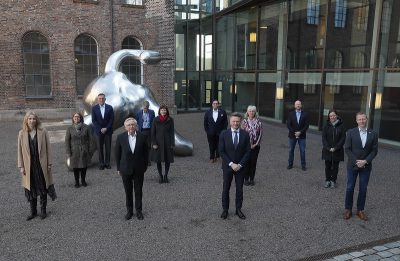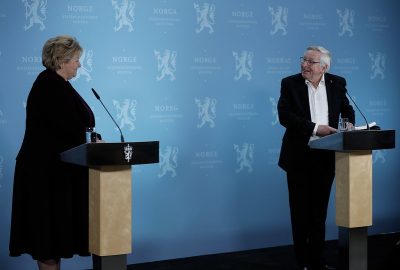Norway has survived the Corona pandemic better than most, according to a state commission that delivered its verdict Wednesday on how the country has handled it. Preparedness for a pandemic was poor, as it was in most other countries, but “Norwegian resiliency” based on the public’s trust in their leaders has carried the country through what the commission called Norway’s “greatest crisis since World War II.”

“The Commission’s overall assessment is that the Norwegian authorities have handled the Covid-19 pandemic well,” the commission wrote in its 450-page report handed over to Prime Minister Erna Solberg. The authorities, however, “would not have been able to succeed without the support and cooperation of the population.” That support, the commission noted, “reflects several aspects of Norwegian society that made it possible to confront the Covid-19 pandemic.”
The report cited “trust and solidarity” as the most important factors that came through strongly during the crisis. It quoted one of Solberg’s initial addresses to the nation in March of last year:
“When freedom has come under threat, Norwegians have given their all for one another. This has given the country an advantage more powerful than any weapon and more valuable than any petroleum fund: our confidence and trust in one another.”
Several strengths
Solberg was referring to Norway’s huge sovereign wealth fund where oil revenues have been saved for future generations over the past 25 years. Her government, backed by Parliament, decided to dip into the fund more than ever before to finance compensation and stimulus programs and cover the extraordinary costs of the crisis. That has also allowed Norway to avoid the huge national debts that many other countries are left saddled with when the crisis subsides.
The so-called “Norwegian Model” that involves economic governance, public-sector welfare policy and a high degree of organized labour as also been a strength during the Corona crisis, as has a good publicly financed health care system. Norway’s high degree of digitalization before the crisis began also helped companies, schools, retail businesses and not least the government to work remotely from private homes and avoid physical contact.

The report also contained criticism that the Norwegian media seized upon quickly. Prepared-ness for a pandemic was poor and both Solberg’s government and those led by her predecessors failed to plan or “create scenarios” for a pandemic.
There was a serious lack of protective gear for health care workers, for example, and little attention had been paid to risk. When the first Corona cases were confirmed in late February, “the situation was undeniably chaotic,” according to the commission. The state public health institute FHI had warned in late January that the Corona virus would come to Norway and the state health directorate (both answerable to the government’s Health Ministry) considered closing schools and other public places. There was a lag, however, and newspaper Aftenposten has also reported mistakes, unclear roles with resulting duplication of work, chaos and conflicts between the two state agencies.
Most have agreed that administrative and government leaders soon started working well together, with the government coming to rely on and following their professional advice on the measures needed to fight the spread of infection. The commission and its leader, Professor and Dr Stener Kvinnsland, called for improvements in crisis planning and communication and clarification of roles among ministries and departments.
The commissin also criticized the lack of a plan to limit and prevent imported infection, along with hastiness in attempts at reopening the country last summer. That backfired badly, with infection soaring after the summer holidays and a third wave of infection hitting after Christmas and New Year. Government ministries were also criticized for letting themselves be influenced by various lobbyists, industries and businesses. Opposition politicians were quick to pick up on the commission’s criticism, with even former government minister Sylvi Listhaug of the Progress Party, which was in charge of preparedness and held control of the justice ministry for six years, slamming delays in closing borders and limiting foreigners’ entry into Norway.
Overall, however, the Norwegian government and Norwegians themselves won high marks. “If we look at this from an international perspective, the conclusions are good,” Kvinnsland said at a press conference Wednesday. “We are coming out of this well and the authorities have together handled things well.”
Solberg had called for the evaluation from the commission in order “to learn from our mistakes.” She stressed to state broadcaster Wednesday afternoon that “we’re not finished with the pandemic yet” and she’s already asked the commission to continue its work.
“It’s natural for the commission to deliver a final report,” Solberg said. “There will still be things we can learn from later.” As she said earlier this week, “when we’ve made mistakes, it’s good to know about them.”
To read the commission’s summary of its evaluation in English, click here (external link to the government’s website).
NewsInEnglish.no/Nina Berglund

